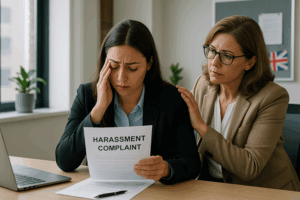Can I sue my employer for workplace harassment in the UK?

It’s not just a joke, or an unimportant remark. When discomfort becomes a daily occurrence, it’s no longer a simple misunderstanding, but harassment in the workplace. In the United Kingdom, the law considers harassment to be any unwanted behaviour linked to a protected ground that undermines your dignity or creates a toxic environment. Whether you are a victim or a witness, you are not alone. Consulting a solicitor who specialises in workplace harassment can make all the difference between suffering and taking legal action to sue for workplace harassment.

Key Takeaway: How can you take effective action if you are being harassed at work?
Discover how to protect your rights and build your case, even when evidence is limited
What is workplace harassment under UK law?
Workplace harassment refers to any unwanted behaviour related to a protected characteristic, such as sex, race, disability, religion, or age, that violates a person’s dignity or creates an intimidating, hostile, degrading, humiliating, or offensive environment. This is recognised as unlawful under the Equality Act 2010 in the UK.
Common examples of workplace harassment include:
- Unwanted sexual advances or inappropriate physical contact.
- Repeated offensive jokes, remarks, or comments.
- Threats, intimidation, or humiliating behaviour.
- Repeated and unwanted contact via emails, messages, or calls.
In the UK, employers have a legal employer duty of care harassment obligation towards their employees. They must:
- Prevent harassment from occurring.
- Implement effective internal policies and procedures.
- Act promptly when harassment is reported.
Failure to fulfil this employer duty of care harassment can result in employer liability harassment UK where employers are held liable for harassment in the workplace.
How can you prove workplace harassment for your workplace harassment claim?
Proving workplace harassment is an essential step when pursuing a workplace harassment claim against your employer. While direct evidence strengthens your case, you don’t always need irrefutable proof to sue for workplace harassment.
However, the type of evidence typically required by courts and tribunals for a successful workplace harassment claim includes:
- Direct evidence: Emails, texts, recordings, or any written communication showing harassing behaviour.
- Witness accounts: Colleagues who witnessed incidents or overheard inappropriate remarks.
- Personal logs: Keeping a detailed diary noting dates, times, what happened, and how it affected you.
- Medical or psychological reports: Documentation of health impacts caused by the harassment, such as stress or anxiety.
You may wonder whether it is still possible to take action without concrete proof. The answer is yes. You can pursue a workplace harassment claim without solid direct proof. Tribunals often rely on a consistent pattern of behaviour or a bundle of evidence rather than a single piece of proof. Consistency and detail in your account are essential for workplace harassment compensation success.
What should you consider before deciding to sue for workplace harassment?
Before pursuing a workplace harassment claim, taking a step back to assess the situation can help you approach it more effectively and minimise personal or professional risks. Asking the right questions can guide your next steps.
What are you really hoping to achieve?
Are you looking for an apology, a team transfer, an end to the behaviour, or workplace harassment compensation? Defining your goal helps determine the best course of action, whether it’s internal mediation, informal resolution, or legal proceedings to sue for workplace harassment.
What could the impact be on your career?
Taking legal action may affect your current working environment or future job prospects, particularly in small or specialised sectors. Being aware of this possibility allows you to prepare without letting it deter you from pursuing workplace harassment compensation.
Who can you speak to for early support?
Discussing the situation with a trusted source can offer perspective and guidance. Consider speaking to:
- A trade union representative or staff liaison.
- An external solicitor or adviser.
- A workplace rights organisation.
Independent advice can help you evaluate your options calmly before deciding to sue for workplace harassment.
Which company policies might strengthen your case?
Review any relevant internal documents, such as:
- Anti-harassment policies.
- Grievance or disciplinary procedures.
- The company’s code of conduct.
Referring to these policies can reinforce the validity of your workplace harassment claim and demonstrate employer liability harassment UK when policies are ignored.
What are the steps to take legal action?
If you want to sue your employer for workplace harassment, it’s important to follow several key steps to build a strong workplace harassment claim and meet legal requirements:
1. Report the harassment internally
Start by informing your manager, human resources department, or the person responsible for handling complaints in your company. This allows your employer to address the issue before it escalates and demonstrates their employer duty of care harassment response.
2. Use ACAS early conciliation
Before taking your workplace harassment claim to the Employment Tribunal, you must contact ACAS (Advisory, Conciliation and Arbitration Service). ACAS offers a free conciliation service to help both parties reach an agreement without going to court.
3. File a claim with the employment tribunal
If conciliation doesn’t resolve the issue, or you decide not to use it, you can submit a workplace harassment claim to the Employment Tribunal. You must do this within three months of the last act of harassment.
4. Prepare your case carefully
Gather all evidence, witness statements, and documents related to the incidents. A well-organised workplace harassment claim improves your chances of obtaining workplace harassment compensation.
What workplace harassment compensation can you get?
When a workplace harassment claim succeeds, the victim may be awarded various types of workplace harassment compensation depending on the nature and seriousness of the case.
What financial compensation can you receive?
Workplace harassment compensation may include:
- Loss of earnings, such as salary or bonuses lost due to time off work, forced resignation, or dismissal.
- Damages for emotional distress, covering anxiety, stress, or trauma caused by the harassment.
- Compensation for the violation of dignity and respect owed to the claimant.
Which types of harm are covered?
Workplace harassment compensation can cover both financial and non-financial harm, including:
- Economic losses like missed promotions or career setbacks.
- Psychological harm such as clinically diagnosed depression or anxiety.
- Damage to reputation or personal dignity.
How do settlement amounts vary?
Workplace harassment settlement amounts vary significantly, typically ranging from a few thousand pounds up to tens of thousands. Factors affecting workplace harassment settlement amounts include:
- The severity and length of the harassment.
- The impact on the claimant’s health and career.
- The employer’s response once the complaint was raised.
- Evidence of employer liability harassment UK and breach of employer duty of care harassment.
Do I need a solicitor for a workplace harassment claim?
When facing workplace harassment, it’s natural to wonder whether you need a solicitor for your workplace harassment claim. While it’s not mandatory, having legal support can offer several important benefits to help protect your rights effectively when you sue for workplace harassment:
- In-depth knowledge of laws relating to workplace harassment claims in the UK.
- Assistance with gathering and organising essential evidence for your case.
- Guidance on the best course of action, including options for settlement or tribunal hearings.
- Professional representation during Employment Tribunal proceedings.
- Increased chances of receiving fair and appropriate workplace harassment compensation.
- Personal support throughout what can be a stressful and complex process.
Professional legal representation significantly improves workplace harassment settlement amounts through expert negotiation and strategic case presentation.
FAQs
1. Can I report harassment if I’m just a witness? Yes. Witnesses are encouraged to speak up. Your report can help protect others, and employers are legally required to investigate any concerns raised under their employer duty of care harassment obligations.
2. What if it’s “just a joke”? Even so-called jokes can count as harassment if they’re repeated or make someone feel uncomfortable. UK law focuses on how the behaviour is received, not the speaker’s intent, when determining employer liability harassment UK.
3. Will making a complaint make things worse for me? No. The law protects employees from retaliation. If you’re treated unfairly for speaking up, you may have grounds for a victimisation claim or additional workplace harassment compensation.
Workplace harassment is never trivial.UK law protects those who choose to speak out. Taking action to sue for workplace harassment is the first step towards regaining control and securing workplace harassment compensation.
Turn your workplace struggle into legal victory!
Qredible’s network of specialist employment solicitors knows exactly how to sue for workplace harassment effectively, maximising your workplace harassment compensation through expert legal strategy and aggressive representation.
KEY TAKEAWAYS
- Workplace harassment covers unwanted behaviour linked to protected characteristics that affect your dignity or create a hostile environment.
- You don’t need direct proof to make a claim, but detailed and consistent documentation strengthens your case.
- Workplace harassment compensation varies widely based on severity, impact, and evidence quality, with professional legal representation crucial for maximising settlement outcomes.
- Consulting a specialist solicitor early improves your chances of fair compensation and protection throughout the process.
Articles Sources
- legislation.gov.uk - https://www.legislation.gov.uk/ukpga/2010/15/contents
- acas.org.uk - https://www.acas.org.uk/harassment-at-work
- gov.uk - https://www.gov.uk/employment-tribunals/harassment-claims
- hse.gov.uk - https://www.hse.gov.uk/stress/standards.htm
- citizensadvice.org.uk - https://www.citizensadvice.org.uk/work/discrimination-at-work/harassment-at-work/
Do you need a solicitor?
Find a solicitor on Qredible in just a few easy steps

















